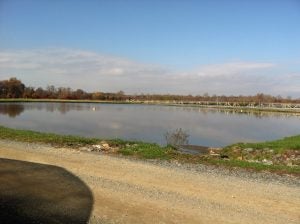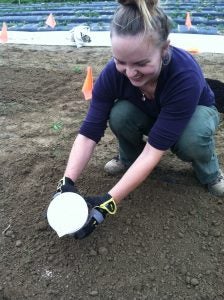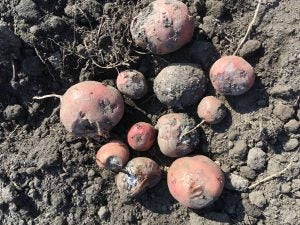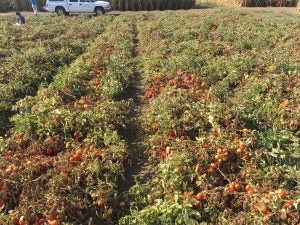Our program conducts applied ecological research on fungal pathogens across a suit of vegetable and field crops. We explore how environmental conditions influence survival and host associations, and seek to better understand life history strategies of Fusarium spp. and other soil borne fungal pathogens as endophytes, pathogens and saprophytes in agroecosystems. All projects aim to produce translational and/or directly applicable information and resources for producers to more effectively co-manage diseases, water use and soil health as interacting components in agricultural systems.
Applied ecology, management and diagnosis of Fusarium pathogens
Soil-borne Fusarium pathogens are among the most destructive to vegetable production in California. Our primary research foci are currently (1) Fusarium pathogens of processing tomato, including Fusarium wilt race 3 and F. falciforme, and (2) Fusarium basal plate rot pathogens of alliums. Stakeholder-driven studies seek to mitigate predisposing factors (drought, salinity, wound-drivers), improve crop rotations, enable effective use of resistant cultivars, explore efficacy of chemicals and suppressive cover crops, understand and manage seed-borne infections, and elucidate pathosystem biodiversity in ecological, biological and phylogenetic contexts, to develop pathogen-specific diagnosis and detection tools.
Fusarium wilt of tomato: Ecology, biology and management
Demystifying effects of water scarcity on plant disease
Impacts of water use strategies viewed through the lens of plant microbiology
In California agriculture, increased water scarcity is driving use of low quality groundwater and adoption of deficit irrigation strategies. This has the potential to affect plant health directly by increasing water stress and mineral  toxicity, and indirectly by influencing how beneficial and harmful microbes interact with their plant hosts and eachother. Our program at the University of California Davis seeks to demystify risks, enabling producers to optimize water use and minimize disease losses from soil borne plant pathogens. —More—
toxicity, and indirectly by influencing how beneficial and harmful microbes interact with their plant hosts and eachother. Our program at the University of California Davis seeks to demystify risks, enabling producers to optimize water use and minimize disease losses from soil borne plant pathogens. —More—
Co-managing soil health and soil-borne diseases
 With increasing intensification of land use, soil borne diseases require a more nuanced approach to management. Continuous cropping without fallow periods can allow persistence of pathogens, if crops are symptomatic or asymptomatic hosts. Goals of research are to understand ecology and evolution of soil borne plant pathogens in terms of cryptic host range, survival abilities across different environmental conditions, and population structure.
With increasing intensification of land use, soil borne diseases require a more nuanced approach to management. Continuous cropping without fallow periods can allow persistence of pathogens, if crops are symptomatic or asymptomatic hosts. Goals of research are to understand ecology and evolution of soil borne plant pathogens in terms of cryptic host range, survival abilities across different environmental conditions, and population structure.
Integrated management of southern blight in annual rotation systems
 Southern blight, caused by Sclerotium rolfsii, is a damaging disease in California annual crops and can lead to field abandonment in southern counties. This disease is a particular challenge to organic growers, including potato growers where organic acreage is a significant percent of the industry. In the face of insufficient management options and climate-change-driven increases in outbreak frequency, we aim to better understand pathogen ecology in order to develop integrated management strategies for key affected crops, including potato, tomato, sunflower and cucurbits. This includes understanding conditions that are optimal for disease development, to develop predictive forecasting tools for fungicide use, assessing impacts of irrigation and soil management strategies, and evaluating crop rotations which can reduce disease loss and suppress pathogen survival.
Southern blight, caused by Sclerotium rolfsii, is a damaging disease in California annual crops and can lead to field abandonment in southern counties. This disease is a particular challenge to organic growers, including potato growers where organic acreage is a significant percent of the industry. In the face of insufficient management options and climate-change-driven increases in outbreak frequency, we aim to better understand pathogen ecology in order to develop integrated management strategies for key affected crops, including potato, tomato, sunflower and cucurbits. This includes understanding conditions that are optimal for disease development, to develop predictive forecasting tools for fungicide use, assessing impacts of irrigation and soil management strategies, and evaluating crop rotations which can reduce disease loss and suppress pathogen survival.
—More—
